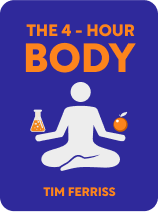

This article is an excerpt from the Shortform book guide to "The 4-Hour Body" by Timothy Ferriss. Shortform has the world's best summaries and analyses of books you should be reading.
Like this article? Sign up for a free trial here .
Are you looking for Tim Ferriss quotes? How do Tim Ferriss quotes reflect the main points of The 4-Hour Body?
The 4-Hour Body is about improving your body’s performance, which author Tim Ferriss did for himself. These Tim Ferriss quotes share the important messages from his experience.
Keep reading for three Tim Ferriss quotes from The 4-Hour Body.
Tim Ferriss Quotes
“The decent method you follow is better than the perfect method you quit.”
The first of the Tim Ferriss quotes is about experimentation and finding what works for you. To successfully carry out an experiment (or to stick to a program that your experimentation has revealed is effective), you need to change your lifestyle. This can be hard when the change makes your life uncomfortable or inconvenient. Even though logic might tell us that we need to make changes, logic isn’t enough of a motivator to result in behavioral changes. For example, many people struggle to quit smoking even if their lung health depends on it.
There are two reasons you may not stick with plans:
- The stakes aren’t high enough. You would like to successfully make a change, but life’s not that bad if you don’t.
- For example, Chad had been overweight for years and knew it was a problem, but he couldn’t bring himself to do anything permanent about it. He wasn’t going to drop down dead if he hadn’t lost weight by a certain time.
- You’re not tracking your progress. You can’t hold yourself accountable if you don’t know how closely you’re sticking to the program.
Fortunately, there are some strategies for mitigating these factors:
Strategy #1: Force an epiphany. Don’t just wish for change—think of it as necessary.
- For example, when Chad was clothes shopping, he realized he wasn’t going to look good in anything because of his weight. This was the tipping point that propelled him to change.
Strategy #2: Measure a variable. Ideally, you’ll measure the variable most responsible for creating results, but if that’s not possible, measure something else—measuring something is better than nothing.
- For example, counting calorie intake isn’t a particularly good indicator of weight loss, but if it’s all you’ve got, measure it anyway. (Measuring body fat percentage would be better.)
Strategy #3: Oversimplify. It’s a lot of work to track and record changes, and the effort required can be discouraging. To avoid this pitfall, estimate instead of striving for exact numbers. The difference is likely negligible, especially if the numbers are large. As long as you’re close, you’ll see results.
- For example, Chad planned a week’s worth of meals and calculated the exact calorie count, aiming to eat five or six 200-calorie meals a day. After that first week, he estimated how many calories were in his meals, based on what he’d learned from the week’s worth of experience. His estimates were close enough that he saw results.
Strategy #4: Accept halfway completion. Even if you can’t finish something, or you can’t do it perfectly, you’ll still reap some benefits from having done part of it.
- For example, if you never exercise, doing just a little bit of inefficient exercise is still an improvement.
“The minimum effective dose (MED) is defined simply: the smallest dose that will produce a desired outcome.”
The second of the Tim Ferriss quotes covers an important concept in his work. An important part of your experimentation will be to find the minimum effective dose (MED), which is the smallest dose that will create a particular result. For example, the MED to boil water is 212 degrees Fahrenheit. Heating water past 212 degrees doesn’t make it any more boiled. Further heating just wastes fuel.
Whenever you want to make a change to your body, only do the minimum that’s required to cause the change. This is for two reasons:
Reason #1: Avoiding injury. If you do more than you need to, you’ll actually slow your progress or go backwards because you’ll tire yourself out and overload your body’s healing mechanisms.
- For example, if you need to put your shoulders under 100 pounds of tension for two minutes twice a week to strengthen them, don’t train every day—you’ll put your shoulders under unnecessary strain and risk injury. Instead, only do the minimum.
Reason #2: Saving time and energy. Pareto’s principle states that in general, 80% of results are caused by 20% of the effort. When it comes to performance science, the ratio is even higher—according to the author, 2.5% of effort is responsible for 95% of results. Doing more than you have to isn’t going to have much effect and is a waste of your time.
“People suck at following advice. Even the most effective people in the world are terrible at it.”
The last of the Tim Ferriss quotes is about the importance of your own role in discovering the plan you need. The 4-Hour Body (4HB) is an experimental lifestyle with the goal of finding out what makes your body work best. Self-experimentation has several benefits over conventional science—it’s personalized, fast-paced, multi-disciplinary, and free from corporate agenda.
Author Tim Ferriss has been living this lifestyle for years, and in The 4-Hour Body, he shares what he’s learned about his own body from researching scientific literature, interviewing experts, and self-experimentation. The book’s title comes from a 28-day experiment in which he spent only four hours total in the gym but lost 3 pounds of fat, gained 34 pounds of muscle, and decreased his total cholesterol.
While everyone’s body is different, much of what the author discovered is broadly applicable to most people, so you can use his recommendations as a starting point and inspiration for your own self-experimentation.
(Shortform note: We recommend consulting your doctor before starting any of the book’s programs or self-experimenting.)

———End of Preview———
Like what you just read? Read the rest of the world's best book summary and analysis of Timothy Ferriss's "The 4-Hour Body" at Shortform .
Here's what you'll find in our full The 4-Hour Body summary :
- How to do the least amount you need to do for the results you want
- Why you need a cheat day in your diet
- How to improve everything about your body, including sleep, sex, and longevity






